Unit 10 You're supposed to shake hands. Section B 2a-2e课件(共26张PPT)2023-2024学年人教版英语九年级全册
文档属性
| 名称 | Unit 10 You're supposed to shake hands. Section B 2a-2e课件(共26张PPT)2023-2024学年人教版英语九年级全册 |
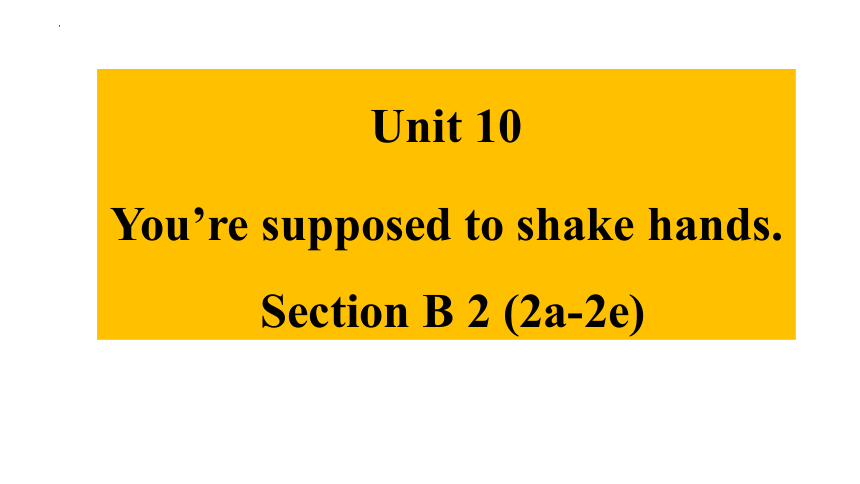
|
|
| 格式 | pptx | ||
| 文件大小 | 46.2MB | ||
| 资源类型 | 教案 | ||
| 版本资源 | 人教新目标(Go for it)版 | ||
| 科目 | 英语 | ||
| 更新时间 | 2023-11-02 14:07:34 | ||
图片预览

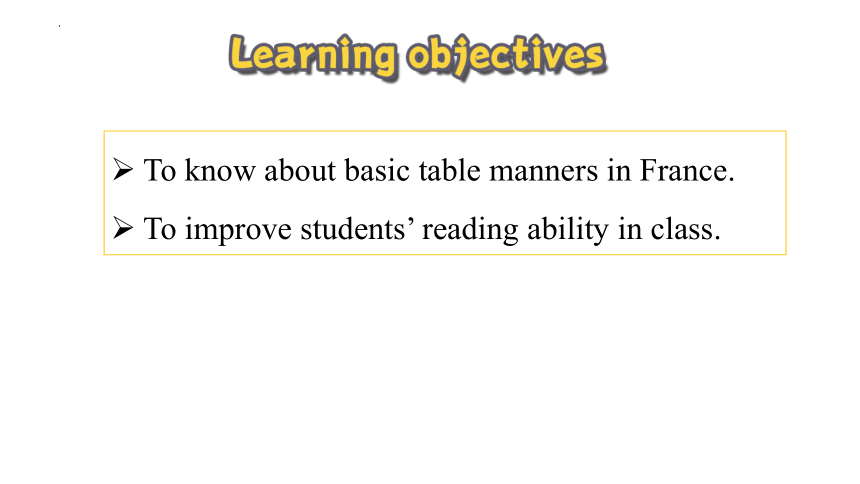
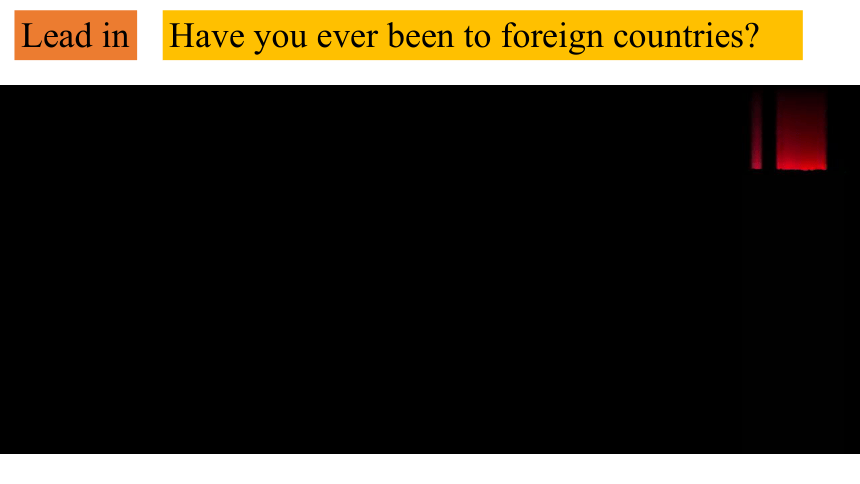
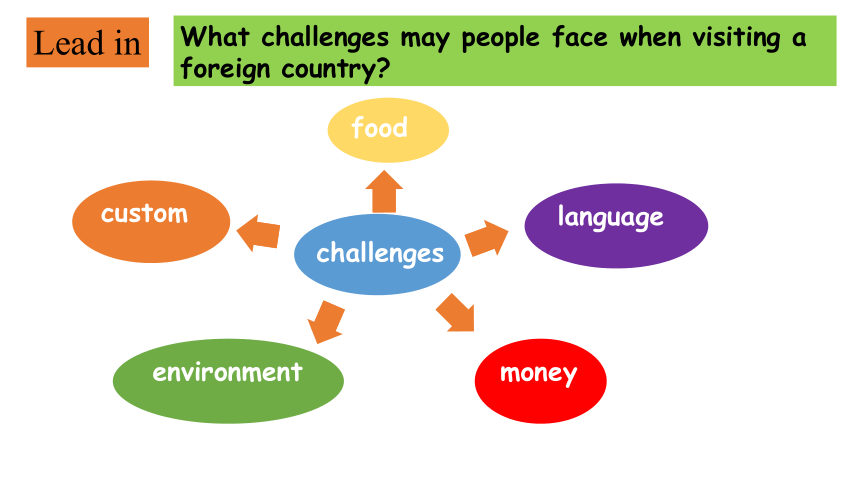
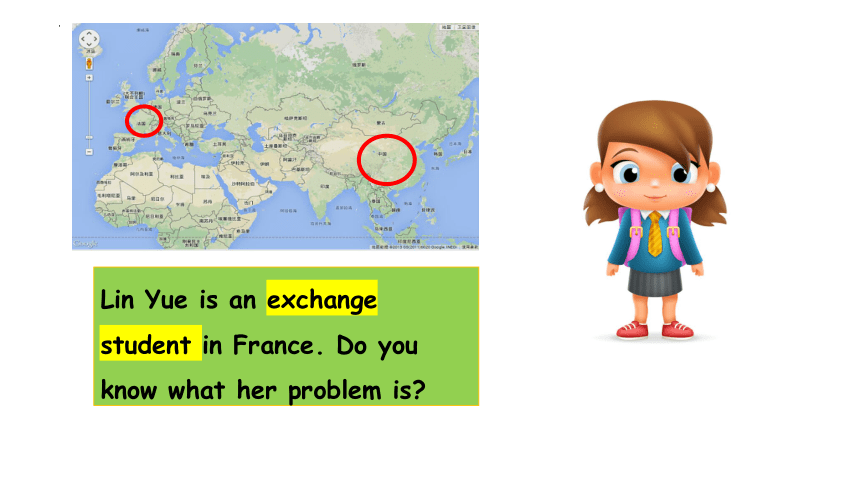

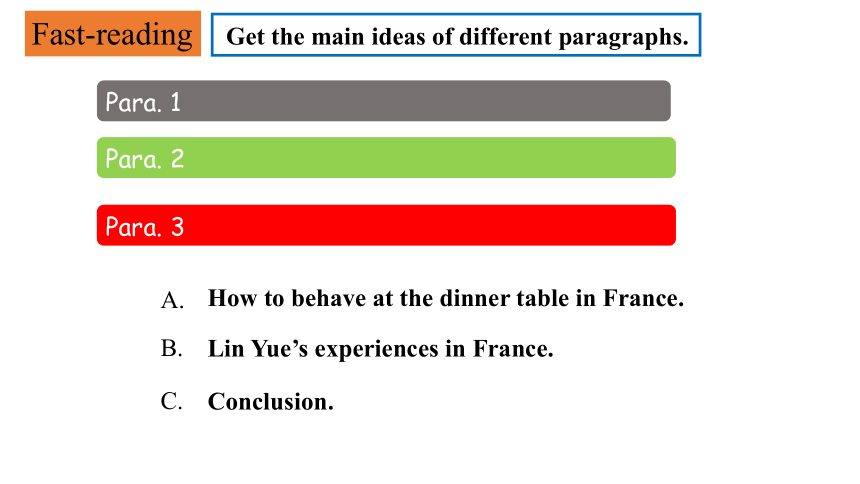

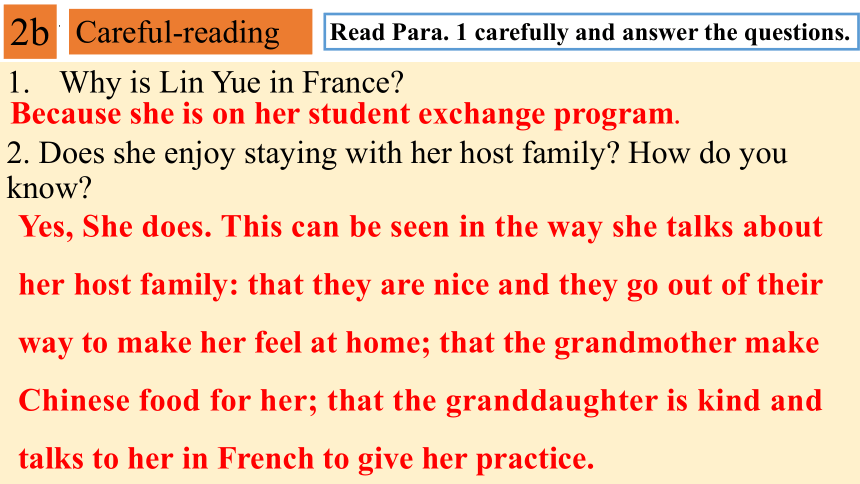
文档简介
(共26张PPT)
Unit 10
You’re supposed to shake hands.
Section B 2 (2a-2e)
To know about basic table manners in France.
To improve students’ reading ability in class.
Have you ever been to foreign countries
Lead in
Lead in
What challenges may people face when visiting a foreign country
challenges
language
custom
environment
money
food
Lin Yue is an exchange student in France. Do you know what her problem is
Prediction
Look at the picture and guess what the passage is about.
A: Lin Yue’s Life in France
B: People’s life in France
C: Table manners
Topic sentence : I’m having a good time on my student exchange program in France.
Para. 1
Get the main ideas of different paragraphs.
Para. 3
Para. 2
B.
C.
A.
How to behave at the dinner table in France.
Lin Yue’s experiences in France.
Conclusion.
Fast-reading
Dear Laura,
Thanks for your message. Yes, I’m having a great time on my student exchange program in France. I was a bit nervous before I arrived here, but there was no reason to be. My host family is really nice. They go out of their way to make me feel at home. The grandmother knows that I miss Chinese food a lot. So she actually learned how to make Chinese food! She also has a teenage granddaughter about my age who is really kind. She always talks to me in French to help me practice. You wouldn’t believe how quickly my French has improved because of that. I’m very comfortable speaking French now. Although I still make lots of mistakes, it doesn't worry me as it used to.
Careful Reading Para.1
exchange / ks't e nd / n. & v. 交换
e.g. An exchange of opinions is helpful.
交换意见是有帮助的。
I want to give you an apple in exchange for a pear.
我想用一个苹果跟你换一个梨。
go out of one’ s way to do sth.
= try one’s best to do sth.
特地 / 格外努力做某事
e.g. He would go out of his way to help anyone in trouble.
他愿意竭尽所能帮助有困难的人。
make sb. feel at home
使某人感到宾至如归
because 连词,引导原因状语从句。
because of 介词短语,后接名词、代词或动词的-ing 形式。
Careful-reading
Read Para. 1 carefully and answer the questions.
Why is Lin Yue in France
2. Does she enjoy staying with her host family How do you know
Because she is on her student exchange program.
Yes, She does. This can be seen in the way she talks about her host family: that they are nice and they go out of their way to make her feel at home; that the grandmother make Chinese food for her; that the granddaughter is kind and talks to her in French to give her practice.
2b
3. How does she feel about making mistakes when she speaks French
She doesn’t feel worried as it used to.
Lin Yue’s life in
France
Grandmother: learns how to
_______________
Enjoyable
make Chinese food
Granddaughter: talks to her in French to _________________
help her practice
She is very ____________________________ now
comfortable speaking French
Why is her host family really nice
Host family go out of their way to ___________________
make her feel at home
Careful reading Para.2
My biggest challenge is learning how to behave at the dinner table. As you can imagine, things are very different from the way they are at home. For example, you’re not supposed to put your bread on your plate. You’re supposed to put it on the table! I thought that was pretty strange at first, but now I’m used to it. Another example is that you’re not supposed to eat anything with your hands except bread, not even fruit. You have to cut it up and eat it with a fork. Another thing is that it is impolite to say you’re full. If you don’t want any more food, you should just say, “That was delicious.” Also, you’re not supposed to put your elbows on the table. I have to say that I find it difficult to remember everything, but I’m gradually getting used to it. I don’t find French customs so strange anymore.
except 除……之外(后面的成分不包括在内)
besides 除……之外还(后面的成分包括在内)
We all went on a picnic except Tom.
We all went on a picnic besides Tom.
it是形式宾语,后面的不定式短语是真正的宾语。
结构 含义 用法
be/get used to 习惯于 后接名词、代词、动名词或名词短语。be 强调状态;get 强调动作。
used to 过去常常 后接动词原形
be used to 被用来做 后接动词原形。
be used for 被用于 后接名词、代词或动名词。
How many table manners are mentioned there
For example
Another example
Another thing
Also
2b 4. What’s the biggest challenge she is facing Why
Her biggest problem is how to behave at the dinner table. Because French table manners are different from the table manners in her own country.
I’ll write again soon and tell you more about my life in France. Hope you’re having a good school year.
Yours,
Lin Yue
Careful reading Para.3
Read Para. 3 carefully and fill in the mind map.
Wish
结尾并祝福对方(Para. 3)
I’ll write again soon and tell you more about my life in France.
Hope you’re having a good school year.
Read the sentences and replace the underlined words with the phrases in the box.
2c
1. Making mistakes in French used to make Lin Yue nervous.
(something) worry
(someone)
2. It was quite hard for her to feel good about speaking French.
be comfortable
(doing)
Post-reading
3. The host family tried very hard to help Lin Yue.
went out of their way
4. Lin Yue has slowly learned how to be like her French friends.
gradually gotten
used to being
Dos Don’ts
You’re expected to put your bread on the table You’re not supposed to put your bread on your plate
cut up your fruit and eat it with a fork
say “That was delicious.” if you don’t want any more food
eat anything with your hands except bread
say you’re full
put your elbows on the table
2d Read Para. 2 carefully and fill in the chart.
Careful-reading
2e Group work
Work in group and then make an interview about the table manners in France and China. How are they the same or different
You are a reporter
interviewee
French
Chinese
A: What are you supposed to do in France
B: In France, people put their bread on the table. But in China, we always put our food on a plate or in a bowl. We never put food on the table.
When in Rome, do as the Romans do.
Different countries have different customs. We should respect different cultures.
Table manners
Lin Yue’s Life
in France
A nice host family
Dos
She has a great time.
She feels at home.
Don’ts
not so strange
bread table
hands bread
fruit fork
“That was delicious.”
bread plate
“I’m full.”
elbows table
Language
Food
Summary:
1. 在美国,人们应该握手。
In America, people ______________ shake hands.
2. 我发现记住一切很难。
I find ____ ________ to remember everything.
根据汉语意思完成句子。
are supposed to
difficult
it
Exercise
3. 我现在已习惯于晚饭后散步。
I am now used to ________ after dinner.
4. 我喜欢吃水果,除了香蕉,它们太甜了。
I like to eat fruit ______ bananas. They’re too sweet.
except
walking
5. 汤姆病了,除了他之外每个人都去了博物馆。
Tom was ill. Everyone went to the museum ______ ______.
6. 你能告诉我怎样有礼貌地表现吗?
Can you tell me ________ to ________ politely?
except
him
how behave
Thank you!
Unit 10
You’re supposed to shake hands.
Section B 2 (2a-2e)
To know about basic table manners in France.
To improve students’ reading ability in class.
Have you ever been to foreign countries
Lead in
Lead in
What challenges may people face when visiting a foreign country
challenges
language
custom
environment
money
food
Lin Yue is an exchange student in France. Do you know what her problem is
Prediction
Look at the picture and guess what the passage is about.
A: Lin Yue’s Life in France
B: People’s life in France
C: Table manners
Topic sentence : I’m having a good time on my student exchange program in France.
Para. 1
Get the main ideas of different paragraphs.
Para. 3
Para. 2
B.
C.
A.
How to behave at the dinner table in France.
Lin Yue’s experiences in France.
Conclusion.
Fast-reading
Dear Laura,
Thanks for your message. Yes, I’m having a great time on my student exchange program in France. I was a bit nervous before I arrived here, but there was no reason to be. My host family is really nice. They go out of their way to make me feel at home. The grandmother knows that I miss Chinese food a lot. So she actually learned how to make Chinese food! She also has a teenage granddaughter about my age who is really kind. She always talks to me in French to help me practice. You wouldn’t believe how quickly my French has improved because of that. I’m very comfortable speaking French now. Although I still make lots of mistakes, it doesn't worry me as it used to.
Careful Reading Para.1
exchange / ks't e nd / n. & v. 交换
e.g. An exchange of opinions is helpful.
交换意见是有帮助的。
I want to give you an apple in exchange for a pear.
我想用一个苹果跟你换一个梨。
go out of one’ s way to do sth.
= try one’s best to do sth.
特地 / 格外努力做某事
e.g. He would go out of his way to help anyone in trouble.
他愿意竭尽所能帮助有困难的人。
make sb. feel at home
使某人感到宾至如归
because 连词,引导原因状语从句。
because of 介词短语,后接名词、代词或动词的-ing 形式。
Careful-reading
Read Para. 1 carefully and answer the questions.
Why is Lin Yue in France
2. Does she enjoy staying with her host family How do you know
Because she is on her student exchange program.
Yes, She does. This can be seen in the way she talks about her host family: that they are nice and they go out of their way to make her feel at home; that the grandmother make Chinese food for her; that the granddaughter is kind and talks to her in French to give her practice.
2b
3. How does she feel about making mistakes when she speaks French
She doesn’t feel worried as it used to.
Lin Yue’s life in
France
Grandmother: learns how to
_______________
Enjoyable
make Chinese food
Granddaughter: talks to her in French to _________________
help her practice
She is very ____________________________ now
comfortable speaking French
Why is her host family really nice
Host family go out of their way to ___________________
make her feel at home
Careful reading Para.2
My biggest challenge is learning how to behave at the dinner table. As you can imagine, things are very different from the way they are at home. For example, you’re not supposed to put your bread on your plate. You’re supposed to put it on the table! I thought that was pretty strange at first, but now I’m used to it. Another example is that you’re not supposed to eat anything with your hands except bread, not even fruit. You have to cut it up and eat it with a fork. Another thing is that it is impolite to say you’re full. If you don’t want any more food, you should just say, “That was delicious.” Also, you’re not supposed to put your elbows on the table. I have to say that I find it difficult to remember everything, but I’m gradually getting used to it. I don’t find French customs so strange anymore.
except 除……之外(后面的成分不包括在内)
besides 除……之外还(后面的成分包括在内)
We all went on a picnic except Tom.
We all went on a picnic besides Tom.
it是形式宾语,后面的不定式短语是真正的宾语。
结构 含义 用法
be/get used to 习惯于 后接名词、代词、动名词或名词短语。be 强调状态;get 强调动作。
used to 过去常常 后接动词原形
be used to 被用来做 后接动词原形。
be used for 被用于 后接名词、代词或动名词。
How many table manners are mentioned there
For example
Another example
Another thing
Also
2b 4. What’s the biggest challenge she is facing Why
Her biggest problem is how to behave at the dinner table. Because French table manners are different from the table manners in her own country.
I’ll write again soon and tell you more about my life in France. Hope you’re having a good school year.
Yours,
Lin Yue
Careful reading Para.3
Read Para. 3 carefully and fill in the mind map.
Wish
结尾并祝福对方(Para. 3)
I’ll write again soon and tell you more about my life in France.
Hope you’re having a good school year.
Read the sentences and replace the underlined words with the phrases in the box.
2c
1. Making mistakes in French used to make Lin Yue nervous.
(something) worry
(someone)
2. It was quite hard for her to feel good about speaking French.
be comfortable
(doing)
Post-reading
3. The host family tried very hard to help Lin Yue.
went out of their way
4. Lin Yue has slowly learned how to be like her French friends.
gradually gotten
used to being
Dos Don’ts
You’re expected to put your bread on the table You’re not supposed to put your bread on your plate
cut up your fruit and eat it with a fork
say “That was delicious.” if you don’t want any more food
eat anything with your hands except bread
say you’re full
put your elbows on the table
2d Read Para. 2 carefully and fill in the chart.
Careful-reading
2e Group work
Work in group and then make an interview about the table manners in France and China. How are they the same or different
You are a reporter
interviewee
French
Chinese
A: What are you supposed to do in France
B: In France, people put their bread on the table. But in China, we always put our food on a plate or in a bowl. We never put food on the table.
When in Rome, do as the Romans do.
Different countries have different customs. We should respect different cultures.
Table manners
Lin Yue’s Life
in France
A nice host family
Dos
She has a great time.
She feels at home.
Don’ts
not so strange
bread table
hands bread
fruit fork
“That was delicious.”
bread plate
“I’m full.”
elbows table
Language
Food
Summary:
1. 在美国,人们应该握手。
In America, people ______________ shake hands.
2. 我发现记住一切很难。
I find ____ ________ to remember everything.
根据汉语意思完成句子。
are supposed to
difficult
it
Exercise
3. 我现在已习惯于晚饭后散步。
I am now used to ________ after dinner.
4. 我喜欢吃水果,除了香蕉,它们太甜了。
I like to eat fruit ______ bananas. They’re too sweet.
except
walking
5. 汤姆病了,除了他之外每个人都去了博物馆。
Tom was ill. Everyone went to the museum ______ ______.
6. 你能告诉我怎样有礼貌地表现吗?
Can you tell me ________ to ________ politely?
except
him
how behave
Thank you!
同课章节目录
- Unit 1 How can we become good learners.
- Section A
- Section B
- Unit 2 I think that mooncakes are delicious!
- Section A
- Section B
- Unit 3 Could you please tell me where the restroom
- Section A
- Section B
- Unit 4 I used to be afraid of the dark.
- Section A
- Section B
- Unit 5 What are the shirts made of?
- Section A
- Section B
- Review of Units 1-5
- Unit 6 When was it invented?
- Section A
- Section B
- Unit 7 Teenagers should be allowed to choose their
- Section A
- Section B
- Unit 8 It must belong to Carla.
- Section A
- Section B
- Unit 9 I like music that I can dance to.
- Section A
- Section B
- Unit 10 You're supposed to shake hands.
- Section A
- Section B
- Review of Units 6-10
- Unit 11 Sad movies make me cry.
- Section A
- Section B
- Unit 12 Life is full of the unexpected
- Section A
- Section B
- Unit 13 We're trying to save the earth!
- Section A
- Section B
- Unit 14 I remember meeting all of you in Grade 7.
- Section A
- Section B
- Review of Units 11-14
